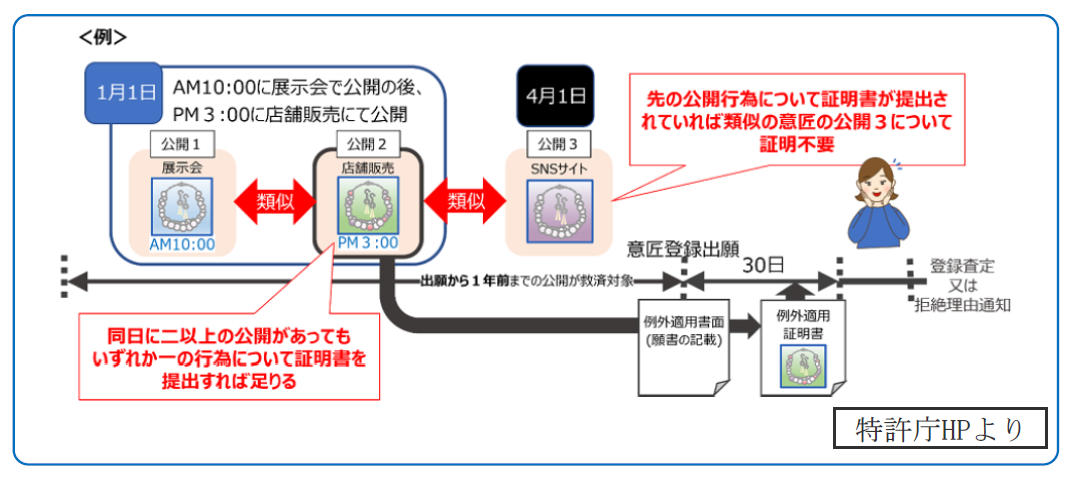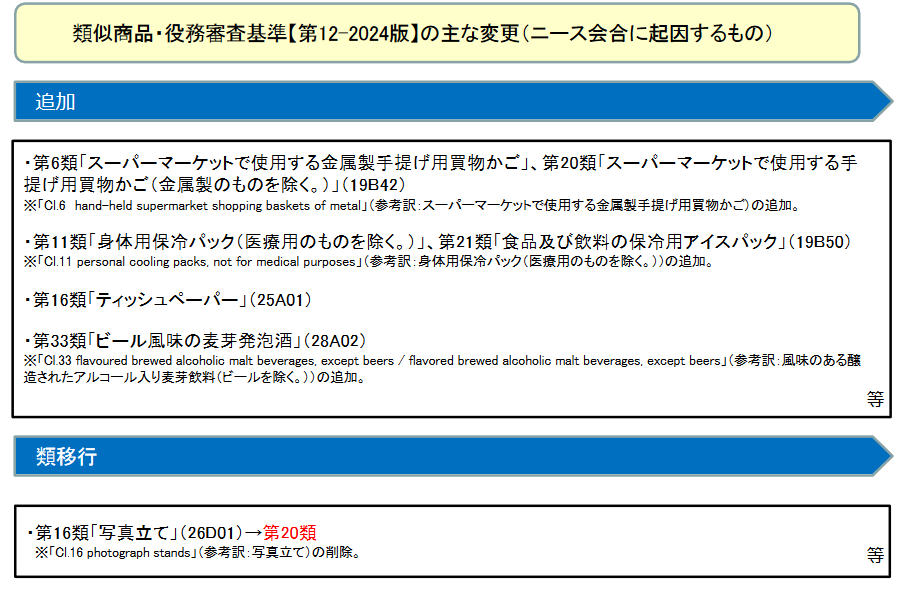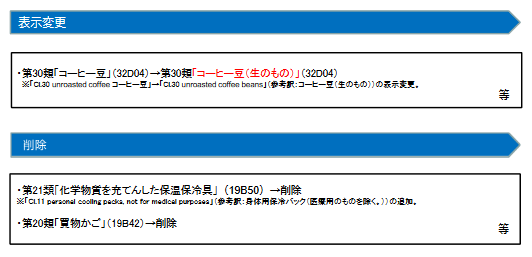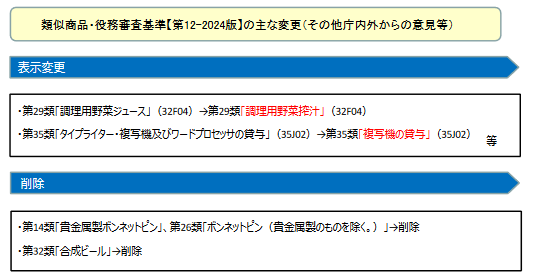목차
1월호 【법무】 뉴스레터

령화 6년 1월 1일 시행
신규성 상실 예외 적용 절차쉬움
당소 뉴스레터에서 전해 온 '의장의 신규성 상실 예외 적용 절차 완화'에 대한 개정이 6년 1월 1일에 시행되게 되었다.
이 날 이후의 출원에 대해서는, 의장 등록을 받을 권리를 가지는 사람(권리의 승계인도 포함한다)의 행위에 기인해 공개된 의장에 대해서, 최후의 공개일의 어느 하나의 공개 행위(동일로 그렇다면 시간의 앞뒤는 묻지 않는다)에 대해 증명함으로써, 최후의 공개일 이후에 공개한 동일 또는 유사한 의장에 대해서도, 수속하지 않고 신규성 상실의 예외 규정의 적용을 받을 수 있도록 된다.
구체적인 운용에 대해서는 '의장심사기준' 및 '의장의 신규성 상실 예외규정(의장법 제4조 제2항)에 대한 Q&A집' 등이 순차적으로 개정되어 공표될 예정이다.

"음성 합성 AI 사용에서 음성의 저작권
2023년 10월 23일, 정보처리학회 컴퓨터 보안 심포지엄 2023 논문집에서 NTT 사회정보연구소가 게이오 기주쿠 대학 대학원 정책·미디어 연구과에 소속하는 연구자와 “음성 합성 AI의 이용 장면에서의 법적 과제- ‘목소리’에 권리는 있을까―’를 출고했다. AI에 의한 음성 합성 기술로 생성된 실재하는 인간의 목소리와 닮은 합성 음성이 이용되는 장면이 향후 상정됨에 따라 그 때 주장할 수 있는 권리에 대해 저작권, 퍼블리시티권, 개인정보 보호 법의 관점에서 검토하고 있다.
저작권에 대해서는, 예를 들면 누구나가 아는 배우가 SNS에 동영상을 투고한 경우, 그 동영상은 본인의 사상 또는 감정을 창작적으로 표현한 저작물이다. 그리고 동영상에 포함된 음성만을 본인에게 무단으로 추출하여 AI에 의해 음성 합성 모델을 작성하는 행위 자체는 저작물에 표현된 사상이나 감정의 향수를 목적으로 하지 않는 정보 해석 연구의 이용에 해당 하기 위해 저작권자의 권리가 제한될 가능성이 있다(저작권법 제2조의 XNUMX제XNUMX호). 다만, 배우의 목소리를 재현할 목적으로 음성 합성 모델만을 사용하는 경우는, 저작물의 종류 및 용도 및 당해 이용의 형태에 비추어 저작권자의 이용을 부당하게 해치게 되어 저작권 침해를 주장할 수 있다 하고있다.
어쨌든 음성 합성 AI의 이용 장면에서 '목소리의 권리'에 대한 개념이 확립될 때까지는 저작권자의 허락을 얻는 것이 중요하다.
특허청, 유사 상품·역무 심사 기준〔국제 분류 제12-2024판 대응〕을 공표
특허청은 유사관계에 있다고 추정하는 상품 또는 서비스를 그룹화하여 각 그룹에 검색을 위한 특정 코드를 부여한 「유사상품·역무심사기준」(이하 「유사기준」이라 한다)을 작성 , 공표하고 있다.
이 「유사기준」은 상표법 제4조제1항제11호의 규정에 근거하여 상표등록출원의 지정상품 또는 지정역무가 타인의 상표등록의 지정상품 또는 지정역무와 유사한 관계에 있는지 여부 심사관이 판단하기 위한 통일적 기준으로서 기능하고 있는 바, 이번(2023년 12월 8일), 특허청은, 유사 상품·역무 심사 기준[국제 분류 제12-2024판 대응]을 공표했다.
본 유사기준은 6년 1월 1일부터 적용된다.
주요 변경 사항은 다음과 같습니다.



이 외, 추가·삭제·표시 변경된 상품·역무는 변경점 일람으로 확인할 수 있다. URL:https://www.jpo.go.jp/system/laws/rule/guideline/trademark/ruiji_kijun/document/ruiji_kijun12-2024/henkouten_ichiran.pdf
[참조]
https://www.jpo.go.jp/system/laws/rule/guideline/trademark/ruiji_kijun/ruiji_kijun12-2024.html
Newsletter translated into English

Relaxation of Procedures for Exception to Lack of Novelty
(Enacted on January 1, 2024)
The amendment to “Relaxation of Procedures for Exception to Lack of Novelty of Design” which we have reported in our previous newsletters will come into force on January 1, 2024. For applications filed on or after January 1, 2024, with respect published due to action by a person who has the right to obtain a registration for said design (including successors of the right), the same or similar designs which were published on or after the earliest publication date may also receive an exception to lack of novelty without need for additional procedures, by providing proof of any act of publication that took place on the earliest date of publication (if more than one publication took place on the same day, the specific timing of the publications does not matter).
The “Design Examination Guidelines” and the “Collection of Questions and Answers on Exceptions to Lack of Novelty of Designs (Article 4(2) of the Design Act)” will be revised and published in due course.

Copyright of Voice in the Use of Speech Synthesis AI
On October 23, 2023, NTT Socio-Informatics Research Laboratories, together with researchers affiliated with the Graduate School of Media and Governance of Keio University, submitted a paper entitled “Legal Issues in the Use of Speech Synthesis AI: Do We Have Rights to ' Voices'?”. The article examines the rights that can be asserted in the future use of synthetic voices that closely resemble real human voices, generated by AI voice synthesis technology, from the perspective of copyright, right of publicity, and personal information prote .
With regard to copyright, for example, when a well-known actor posts a video on a social networking service, the video is a work that creatively expresses his/her thoughts or feelings. And the act of extracting only the voice contained in the video without the actor's permission and creating a text-to-speech model using AI itself may fall under the use of information analysis research that does not aim to enjoy the thoughts and feelings expressed in the work, and thus the copyright holder's rightsy Article 30-4-2 of the Copyright Act). However, if only a speech synthesis model is used for the purpose of reproducing an actor's voice, the copyright owner can claim copyright infringement because the use is unreasonably prejudicial to the copyright own light of the type and intended use of the copyrighted work and the manner of such use.
In any case, until the concept of “voice rights” in the use of speech synthesis AI is established, it is important to obtain the permission of the copyright holder.
JPO Publishes Examination Guidelines for Similar Goods and Services
(International Classification of Goods and Services, Edition 12-2024)
The JPO has prepared and published the “Examination Criteria for Similar Goods and Services” (hereinafter referred to as the “similarity criteria”), in which goods or services that are presumed to be similar are grouped together and each group is assign for search purposes. The “similarity criteria” are based on the Trademark Law and the Trademark Law.
These “similarity criteria” function as uniform criteria for examiners to determine whether the designated goods or designated services of an application for trademark registration are similar to the designated goods or designated services of another person's trademark registration, in xi) of the Trademark Law. On December 4, 1, the JPO published the Examination Guidelines for Similar Goods and Services (corresponding to the International Classification of Goods and Services Version 8-2023).
These similarity criteria will be applied from January 1, 2024.
주요 변경 사항은 다음과 같습니다



Other goods and services that have been added, deleted, or changed in the display can be found in the list of changes (URL: https://www.jpo.go.jp/system/laws/rule/guideline/trademark/ruiji_kijun/document/ruiji_kijun12-2024/henkouten_ichiran.pdf).
[See also]
https://www.jpo.go.jp/system/laws/rule/guideline/trademark/ruiji_kijun/ruiji_kijun12-2024.html





